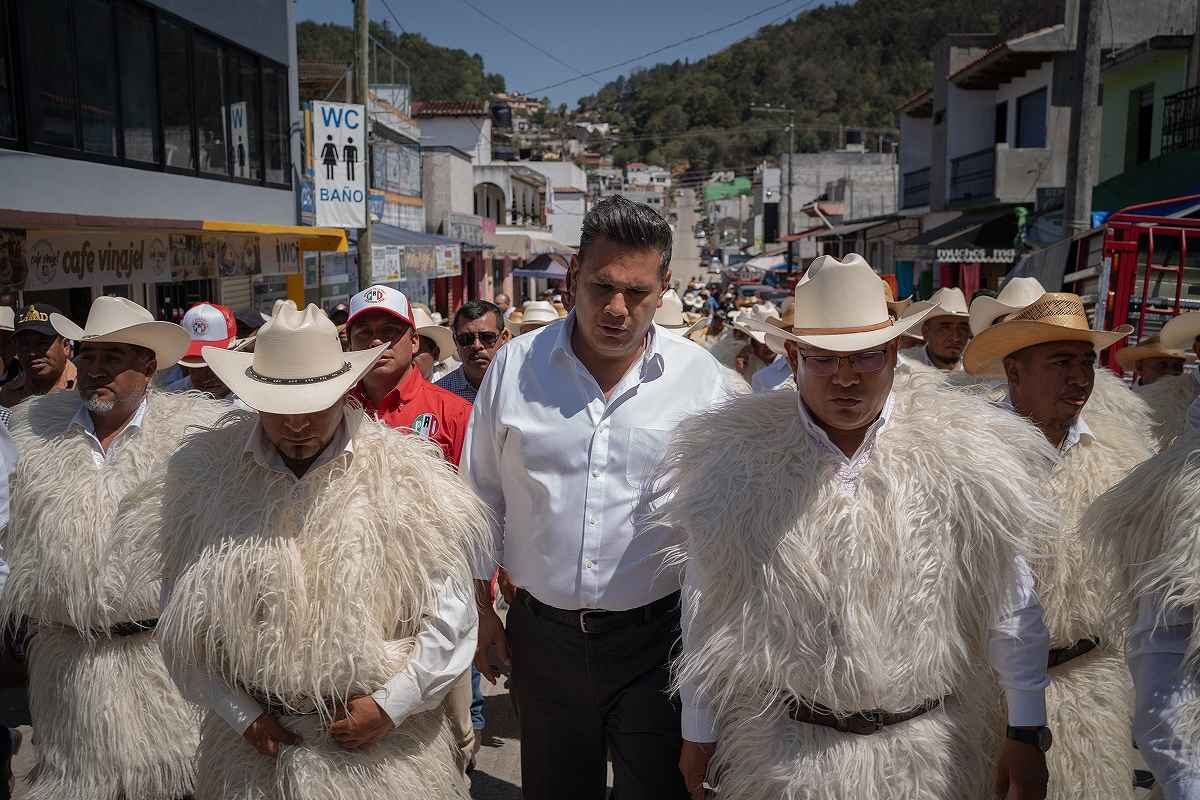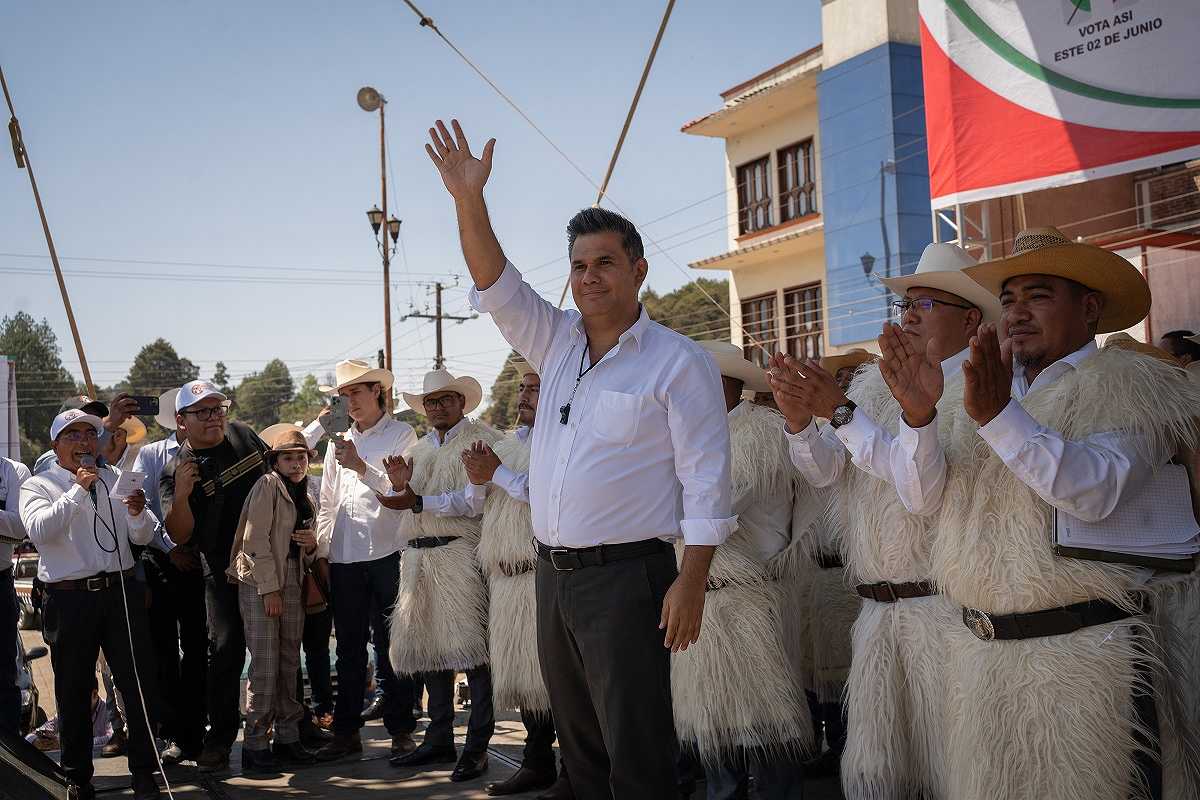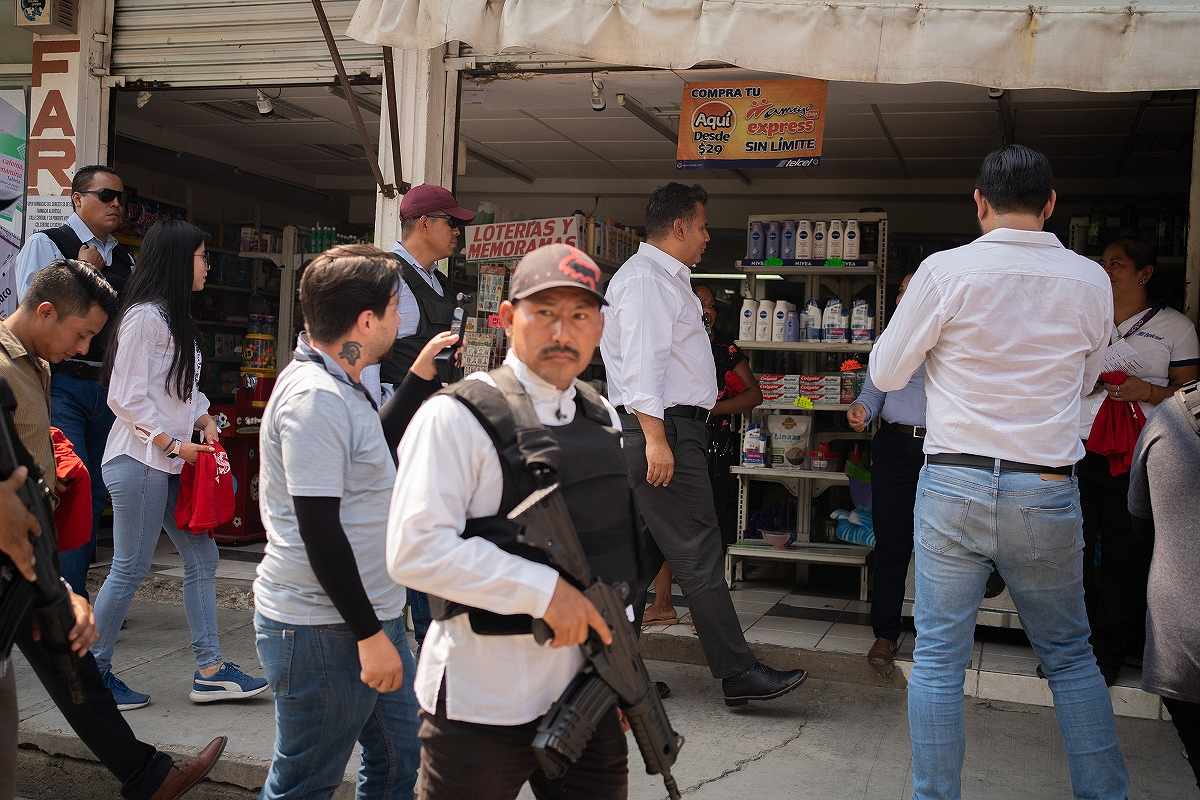
Mexican Senate candidate Willy Ochoa walks with fellow Institutional Revolutionary Party candidates before a rally in San Juan Chamula, Mexico.
12:19 JST, May 12, 2024
VILLA LAS ROSAS, Mexico – This time, Willy Ochoa brought reinforcements.
This time, unlike the last time, he’d be ready for cartel attacks. He was accompanied by three truckloads of national guard troops. Two state police cars with flashing red lights. He rode in his own bulletproof SUV, and had a complement of muscular bodyguards. One sat in the bed of a pickup truck, his eyes fixed on the sky.
“He’s making sure they don’t fire a bomb from a drone,” Ochoa explained.
This is what it’s like to run for the Senate today in Mexico. “You’re at risk every minute,” the candidate said.
Organized crime groups are turning Mexico’s elections into a literal battleground, making the campaign this year one of the deadliest in the country’s modern history. More than two dozen candidates have been killed leading up to the June 2 vote; hundreds have dropped out of the race. More than 400 have asked the federal government for security details. The campaign of intimidation and assassination is putting democracy itself at risk.
The armed groups’ goal is to install friendly leaders in local offices so they can better exploit Mexican communities. Once largely focused on shipping drugs to the United States, the cartels now also smuggle migrants, extort businesses and win contracts for firms they control. They want to name towns’ police chiefs and public works directors.
That makes controlling mayor’s offices crucial. But candidates for governor and Congress are at risk, too. In some areas, cartels wield so much power they can decide who can enter towns – or even what people may say out loud.
“They don’t like it when you talk about the organized crime violence, the extortion, the people forced out of their communities,” said Ochoa, running as the Institutional Revolutionary Party (PRI) candidate to represent Chiapas state in the Senate. When his campaign announces visits to strife-torn areas, he said, “we receive threats and warnings to not come.”
He’d had his own brush with danger in February, when gunmen on motorcycles charged after him, following a campaign stop in a tense town. He wasn’t going to leave himself so vulnerable again.
President Andrés Manuel López Obrador accuses the opposition and media of exaggerating the violence in places such as Chiapas. Yet even López Obrador’s protégé, presidential front-runner Claudia Sheinbaum, was stopped by masked men last month in a region of the state controlled by the Sinaloa cartel. The men warned her to “remember the poor people” and waved her through their checkpoint.
Assassins have targeted candidates from all of Mexico’s major parties. In Maravatío, a municipality of 80,000 in the central state of Michoacan, three candidates for mayor have been killed – two from Morena, López Obrador’s party, and one from the opposition National Action Party, or PAN.
Carlos Palomeque, head of the PAN in Chiapas, says nearly two dozen mayoral candidates from the party have dropped out of their races. It used to be the cartels bought off voters, he says. Now, “they force candidates from the race. It’s cheaper.”
– – –
This year, a different campaign

Ochoa greets supporters in San Juan Chamula.
Ochoa, 45, grew up campaigning. His father, an activist for farmworkers and other social causes, served in Congress. Ochoa loved going to his rallies, traveling from town to town, being part of the sweating, cheering crowds.
His own young sons aren’t getting that experience. Ochoa sent the pair out of state, along with his wife, earlier this year. “I have to keep them safe,” he said as his convoy rolled through the countryside. He pulled up their latest videos on his iPhone.
“Papa, I just prayed for you,” chirped the 7-year-old.
“Only 30 more days till you come back,” said the 9-year-old, smiling into the camera. “I hope you win the election!”
“My kids are adorable,” said Ochoa, and his voice quavered, and he took a big gulp of water.
Ochoa’s been a state lawmaker, a federal congressman and a top official in the PRI. He’s used to the rough-and-tumble of politics, and the long history of ties between Mexican politicians and cartels. But early in the campaign, he realized how different this race would be. In February, he gave a speech in Villa Las Rosas, one of a string of towns near the Guatemalan border used by traffickers to store drugs.
As he left the stage, he said, he was surrounded by around 25 men, some armed. “We have instructions to take you to the man who rules this plaza,” or crime district, one said. Ochoa managed to slip away.
But around 45 minutes later, as he stopped for lunch, he spotted a line of armed men on motorcycles gunning toward the restaurant parking lot. Gunning for him. His bodyguards cocked their automatic rifles. The motorcyclists paused, perhaps waiting for reinforcements, and Ochoa and his convoy sped away.
Now, three months later, Ochoa was returning to Villa Las Rosas.
The walkie-talkie clipped to the seat back started squawking.
“The vehicle in front of us is acting as a cartel lookout,” one bodyguard was saying.
“That guy in a white cap is watching us.”
“Do you see the motorcycle? It’s 60 or 70 meters ahead.”
“They’re sending messages.”
– – –
‘They let different cartels in’
Chiapas, Mexico’s poorest state, burst into the headlines in 1994 when Indigenous peasants launched an armed uprising to demand justice. Led by Subcomandante Marcos, a telegenic, pipe-smoking intellectual, the Zapatista rebels won international sympathy.
Chiapas wasn’t known for cartel violence. Mexico’s lightly guarded southern border had long been a major entry point for U.S.-bound cocaine, and the state’s lush jungles provided cover for clandestine airstrips. But the Sinaloa cartel had a monopoly on drug trafficking, and kept things quiet.
That’s changed in the last few years. Divisions have emerged in the cartel. Democracy has brought new political parties, which allegedly formed links with other trafficking groups. And the number of migrants crossing Mexico soared, fueling a lucrative people-smuggling industry in the border state.
Ochoa, whose party ran Mexico for seven decades in the last century, blames today’s violence on incompetent politicians.
“They let different cartels in,” he said. “They didn’t draw the line.”
These days, around a dozen cartels operate in Chiapas. They include Mexico’s two most powerful crime groups: The Sinaloa and the Jalisco New Generation cartels. Homicides and disappearances have soared. The casualties in recent months include six political candidates.
Yet many residents are too frightened to even talk about the rising criminality. A schoolteacher who organized a march condemning narco-violence in the town of Chicomuselo was tortured and killed in front of his wife and children.
Ochoa is determined to condemn the violence. Sure, it’s good politics – a main theme of the campaign of Xóchitl Gálvez, the presidential candidate backed by the PAN and PRI, the leading challenger to Sheinbaum. But there’s another reason for his outspokenness, Ochoa says.
“I love Chiapas. You have no idea how much.”
– – –
‘This, my friends, isn’t living’
Ochoa had started the day in the Indigenous community of San Juan Chamula. He’d walked the narrow main drag of Villa Las Rosas, shaking hands and chatting with shopkeepers.
Now he sat in his SUV outside a whitewashed community hall on the other side of town as his security team inspected the site. Hundreds of people were inside waiting for him. Many were standing. It had been nearly impossible to rent chairs.
One of Ochoa’s aides slid into the SUV and played a message from an event organizer turning down a request to provide chairs. He could have earned “a few pesos,” he said, but it could “complicate my life.”
Ochoa strode into the hall to the booming carnivallike music typical of Mexican campaigns. Taking the mic, he denounced the plague of extortions, killings and highway robberies.
“This, my friends, isn’t living,” he said.
“I say to all the bad people, the political parties, our adversaries – Willy Ochoa will not give up, and will not drop out.”
Yet his campaign swing that day showed the scale of the challenge. In Villa Las Rosas, the opposition coalition’s mayoral candidate had quit the race. She was replaced by a 28-year-old novice. In Ochoa’s next stop, the town of Socoltenango, the coalition’s mayoral candidate would appear with him, defying warnings to stay away.
That was crossing a line. The candidate, Arturo Navarro, received a death threat, and went into hiding.

Armed security guards accompany Ochoa.
Top Articles in News Services
-

Survey Shows False Election Info Perceived as True
-

Hong Kong Ex-Publisher Jimmy Lai’s Sentence Raises International Outcry as China Defends It
-

Japan’s Nikkei Stock Average Touches 58,000 as Yen, Jgbs Rally on Election Fallout (UPDATE 1)
-

Japan’s Nikkei Stock Average Falls as US-Iran Tensions Unsettle Investors (UPDATE 1)
-

Trump Names Former Federal Reserve Governor Warsh as the Next Fed Chair, Replacing Powell
JN ACCESS RANKING
-

Producer Behind Pop Group XG Arrested for Cocaine Possession
-

Japan PM Takaichi’s Cabinet Resigns en Masse
-

Man Infected with Measles Reportedly Dined at Restaurant in Tokyo Station
-

Israeli Ambassador to Japan Speaks about Japan’s Role in the Reconstruction of Gaza
-

Videos Plagiarized, Reposted with False Subtitles Claiming ‘Ryukyu Belongs to China’; Anti-China False Information Also Posted in Japan

























